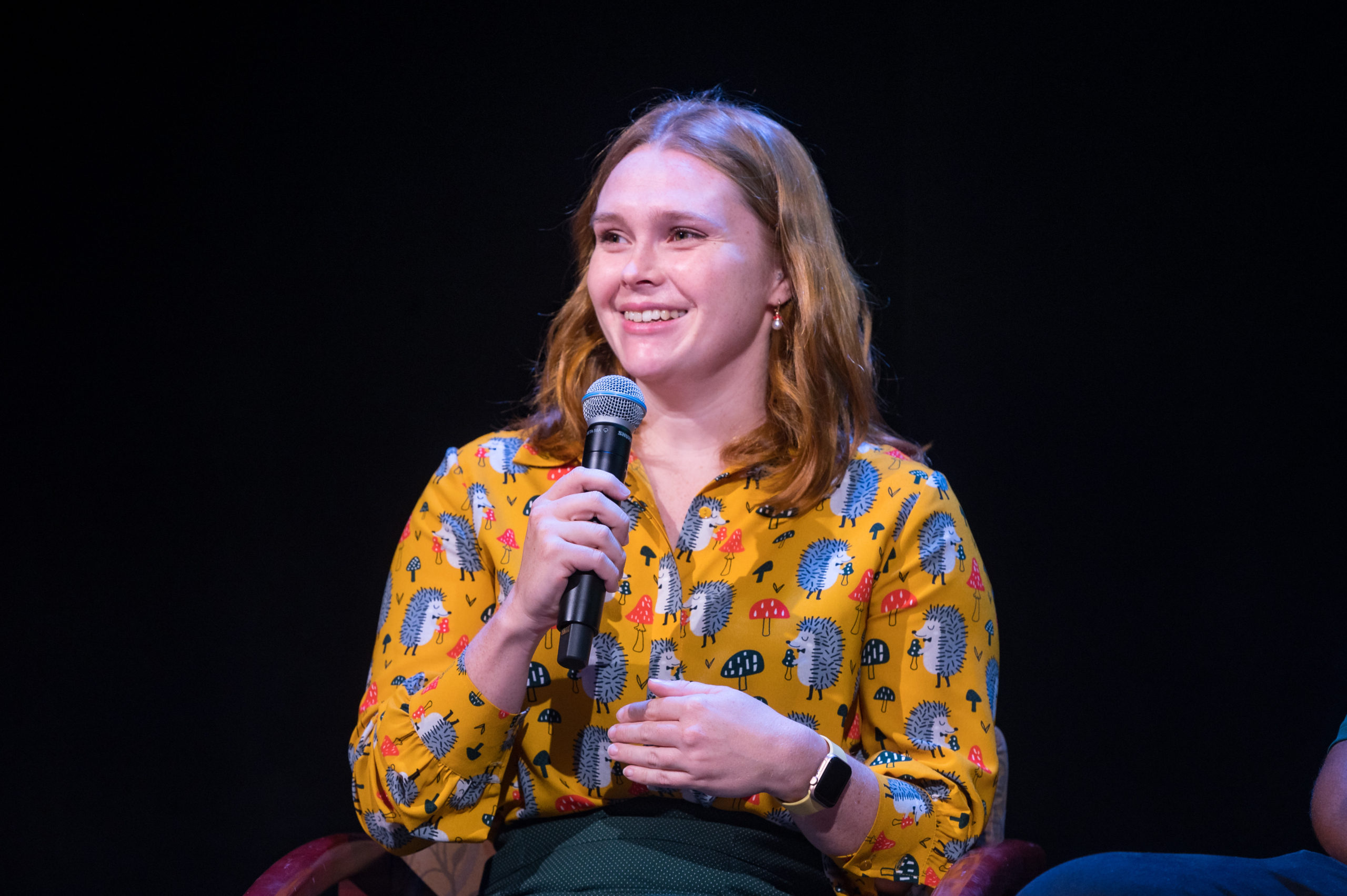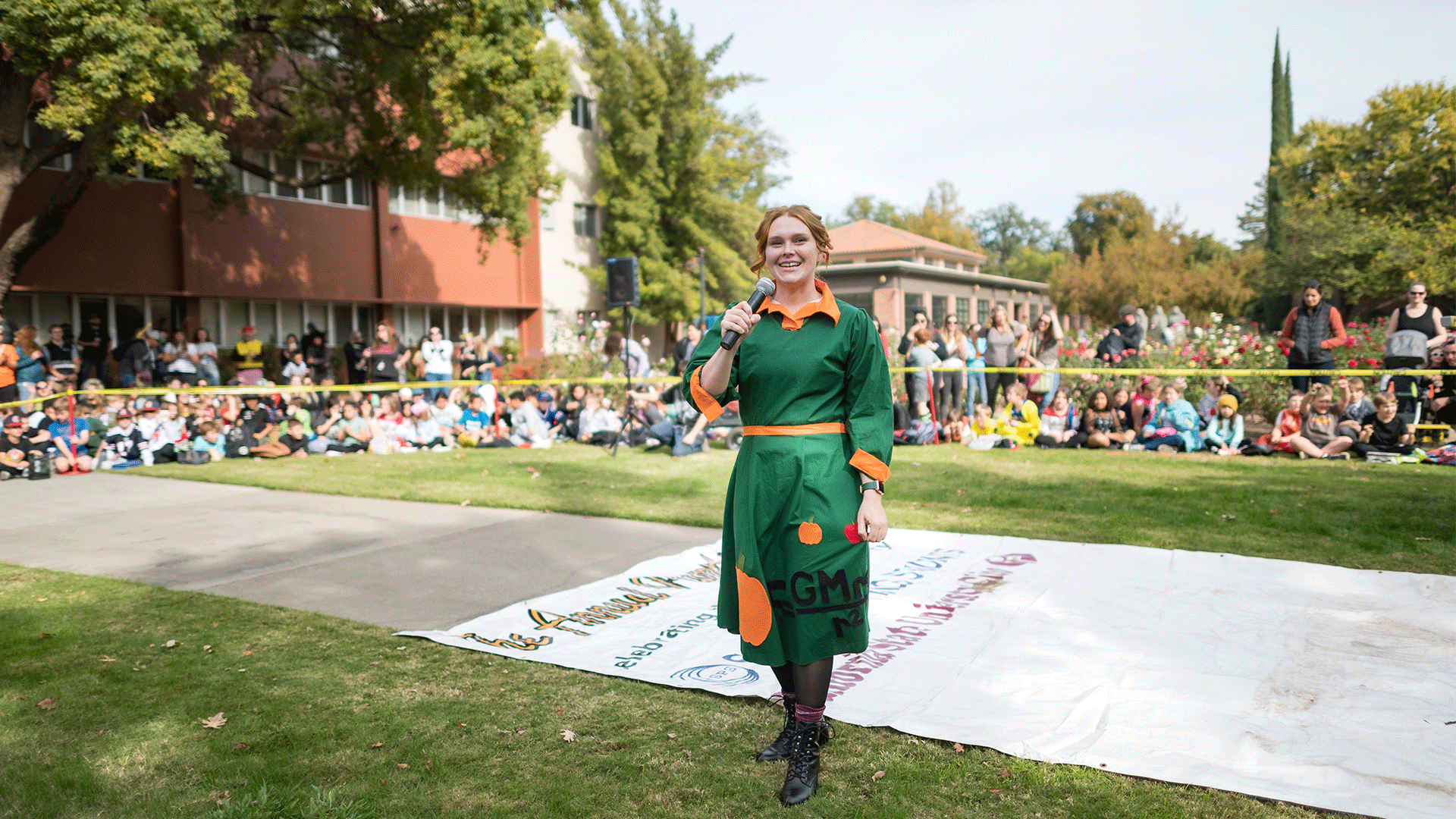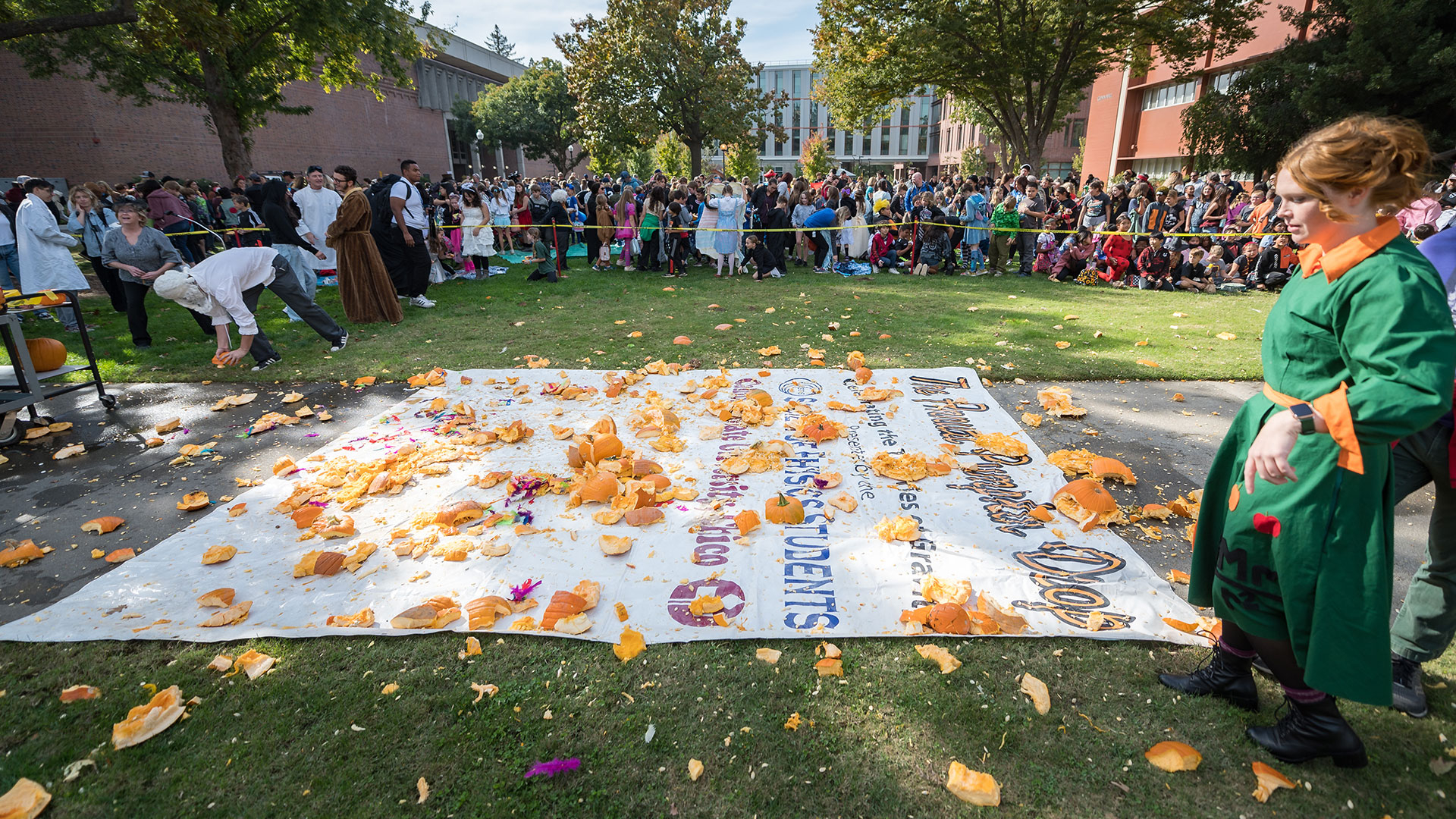Office Hours: Astronomer and Physics Professor Kendall Hall

(Jason Halley/University Photographer/Chico State)
Astronomer and physics professor Kendall Hall believes two things: that astronomy is the gateway to embracing physics.
And that physics isn’t scary—it’s fun.
Hall grew up mesmerized by starry skies on camping trips. Physics offered a lens into how the universe came to be, how it functions, and where we (its only known people) fit in. The field of science has given her a lot—a career, a passion, and a purpose—so it is from a place of deep gratitude that she gives back to her community.
Now in her third semester as an assistant physics professor at the University where she shares a name with one of its most prominent buildings, Hall is making all things in her realm (introductory mechanics, quantum mechanics, and soon, astronomy) more accessible, engaging, and enjoyable. Between her research on the formation of clouds in space, teaching, and spearheading a range of community initiatives, she provided some insight into the ways she’s making physics fun for all.
What was it like hosting the annual pumpkin drop event for the first time since the pandemic caused its hiatus?
I was just excited to witness it. From little children to emeritus professors, who doesn’t enjoy watching pumpkins splatter? Beyond that, I think it’s always exciting to get children onto campus and interested in science. Physics in particular has a bad reputation—it intimidates people. I love events like this that show how it’s fun, not scary. To change the perception, we have to start by reaching people as early as possible.

Community engagement is clearly important to you—where did that start for you and how are you applying it to your role at Chico State?
We’re a big part of the community and as an employee of a state-fund school, I feel like it’s my duty to give back. I’ve also been lucky to learn and work in environments where community engagement is built into the culture. I went to undergrad at Fresno State (don’t hate me for it), which has this unique, one-of-a-kind outreach program. Every Friday, we’d go out to different classrooms across the city, from kindergarten to community college, and do a bunch of fun, accessible physics demos—things like using torque and the idea of an extending lever arm for a 5-year-old to lift their teacher.
I went on to the University of Wisconsin-Madison for graduate school to study astronomy and astrophysics. There, we would open the old historic telescope to the public every Wednesday and visit state parks around Wisconsin every summer with small reflector telescopes for people to try. It was a combination of these things, plus additional events, that really got me interested in community outreach.
Hall Fact #1
Hall and Professor Kevin McLin organized and hosted an astronomy series at the Gateway Science Museum, called “Gateway to the Stars.”
How do you bring a sense of engagement to your classroom?
The classrooms where we have the introductory courses are specifically designed for teaching physics. We use the studio physics model, where students work in groups, do activities and problems together, and then discuss them as groups. There’s basically no traditional lecturing where I stand up at the front with a piece of chalk in my hand and wonder who is paying attention. This is great for students because they get a lot of feedback, and it’s great for me because I get to interact with a lot more students.
My lecture assistant and I are constantly going around, talking to groups, and asking questions. Introduction to physics is not astronomy, but it is the first physics class most students take at Chico State, so I think it’s really important to make it a good one—and try to change people’s minds about physics. For a lot of students, it’s about cementing their choice to become an engineer. Physics is the structure that engineering is built on. You have to understand them, at least in theory.
To see new students go from being a bit weary or unsure about the format to being fully engaged and excited to come to class is really satisfying.
Hall Fact #2
Her current book recommendation is The Disordered Cosmos by Chanda Prescod-Weinstein.
Between tech CEO’s going to space and some exciting projects from NASA, there’s an increase in space related stories in the media. As an astronomer, how do you filter or incorporate this surge in mainstream attention in your classroom?
I have students ask me about astronomy because they know I’m an astronomer. And I’ve had a few people ask about Elon Musk and Space X. I think these are great conversation starters, but I have to manage tangential topics in my physics class.
On a broader scale, the launch of the James Webb Space Telescope (JWST) is exciting. This has been the biggest launch since Hubble, 30 years ago. There have been other space telescopes launched since then, but most people can’t name any of them (I can, but it’s my job). This is a great time to pull people back into the conversation and reinforce the idea that astronomy is great! And then it’s easier to show them that astrophysics is great, too. And then that brings them to a point where they realize that physics is also great—and not scary. I like to think of astronomy as the gateway science. Who’s not looking at the stars? Who doesn’t want to know how black holes are formed or how the universe came to be?
Hall Fact #3
Her research is focused on the formation of clouds and molecules in space.
How do you explain your research to a non-astronomer audience?
When I talk about my work and frame it for the general public, I always feel like it’s not that exciting. I study the formation of clouds and molecules in space. It’s not black holes or exoplanets or anything fancy, but you need to form molecules to form clouds, in order to form stars and to form planets. There is this chain of understanding that starts with the formation of clouds—where stars are born. We like breathing the oxygen around us, so how is oxygen formed? Well, that’s in the stars (spoiler alert).

“From little children to emeritus professors, who doesn’t enjoy watching pumpkins splatter?”
Kendall Hall
Do you have any aspirations of going to space?
No. I get horribly motion sick. Also, I understand the physics. The average density of the Milky Way is one hydrogen atom per cubic centimeter. And when you go from 10 to the power of 18 (approximately) to one, it’s a huge pressure difference. You have to be really brave to understand the science behind space travel and still want to go out there. I want other people to live their dreams, but pictures and the telescope are enough for me.
Hall Fact #4
Hall’s father, also a physics professor, runs a very popular Instagram account @physicsfun, which almost definitely has more followers than yours.
What is important to you, as an educator in the classroom?
Physics in particular has been and continues to be dominated by white men. And while I know that I am white and I come from a lot of privilege growing up in a middle-class family, I think more diverse representation is critically important, as is making sure that people in my class feel seen and heard.
My job is to try to create groups that are effective. Folks settle into groups after three weeks or so. If you’re not in a group where you feel comfortable sharing your ideas and opinions, then you’re not going to learn very well. It’s my job to create those groups using feedback and my own observations. To do this well, you can’t be passive, you need to get involved.
Word Association: First Word to Pops into Your Head
- Hoverboards: Back to the Future
- Mars: The Martian (book cover)
- Telescope: Hubble
- Heights: Pumpkin Drop
- Astrology: Ophiuchus
- Carbon dioxide: Runaway greenhouse effect
I need to ask you about having the same name as the administration building on campus—do you get misdirected phone calls or mail?
It’s why I was hired… kidding. It has caused some complications. Every so often a student will go to Kendall Hall and wander around looking for my office. I had a student email a different professor asking if they could join their class. At one point I couldn’t get keycard access and the email subject line that finally solved this problem said: THIS IS A REAL PERSON.
—
Join Professor Kendall Hall and Professor Kevin McLin at the Gateway Museum on Saturday, Nov. 12 for “Gateway to the Stars,” a free astronomy event conducted in partnership with NASA’s Webb Science Telescope Community Events and local Chico State scientists.


